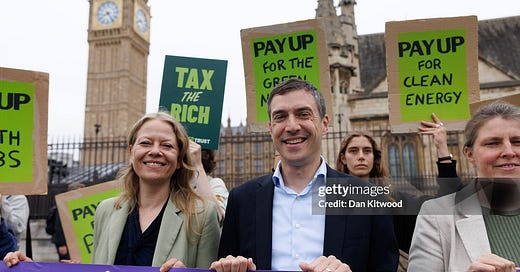Green's pursue punitive wealth tax against rural communities
Most farms generate annual returns of just 0.8 percent to 1.2 percent, a precarious slice of profit that can vanish with a bad harvest, fluctuating prices, or spiralling input costs.
The Green Party’s push for a wealth tax is often dangled as a solution to the country’s social and economic challenges. On the surface, it is framed as a matter of fairness. But when you start looking at what this actually means for British farmers, especially those working the land rather than speculating on it, the picture quickly becomes more complicated.
A farm with land valued at over £10 million might sound like the hallmark of wealth, but the reality on the ground is very different. Farming has never been a high margin business. Most farms generate annual returns of just 0.8 percent to 1.2 percent, a precarious slice of profit that can vanish with a bad harvest, fluctuating prices, or spiralling input costs. For a farm valued at £12 million, that might mean an annual income of around £120,000. Under the Green Party’s proposed one percent wealth tax, the annual bill would absorb that entire return in one go. In tougher years, the tax could easily outstrip the farm’s income, leaving farmers no choice but to sell land or take on more debt simply to meet the obligation.
This comes on the back of Rachel Reeves’ Autumn Budget in October last year, which scaled back key protections like Agricultural Property Relief and Business Property Relief. For many farming families, those reliefs were the safety net that allowed them to pass on their farms without facing crippling tax demands. With those shields now eroded, the addition of a wealth tax piles yet more financial pressure onto businesses that are already balancing on a knife edge.
The Green Party is not blind to farmers’ frustrations. When protests were planned last autumn over changes to inheritance tax, their spokesperson for Food, Agriculture and Rural Welfare, Emily O’Brien, acknowledged the deep sense of abandonment many farmers feel. She said in November:
“Farmers are feeling abandoned. They have suffered badly from Brexit, both via detrimental trade conditions and reduced subsidies. And tax breaks for agricultural land have inflated land values, making it harder for both new entrants and existing farmers.
It is right to clamp down on those who buy farmland to avoid tax and the Green Party strongly supports wealth taxes. But we also need the government to take action to ensure that hard working farmers can earn a decent income.”
It is a striking position. There is a public nod of sympathy towards farmers, yet the policies being pushed would only make their financial position more precarious. The idea that wealth taxes will neatly target tax avoiders while sparing genuine, working farmers seems somewhat detached from the way such taxes are actually felt on the ground. For many, the value is tied up in the land itself. It is not a pool of accessible wealth.
This is especially relevant in current Co-Leader, Adrian Ramsay’s own Waveney Valley constituency, which spans rural parts of both Suffolk and Norfolk. It is an area steeped in agriculture, dotted with family farms and market towns that rely on the rural economy.
Ramsay often speaks about supporting local farmers and championing rural communities, yet at the same time, he is backing tax policies that could hit them hardest. It is a tension that has not gone unnoticed. The message is warm and supportive, but the policies tell another story, one that risks squeezing family farms to the brink.
Perhaps the real question is whether adding more taxes is genuinely the best way to sustain British farming. These businesses need breathing space, not additional burdens.
If farming is to thrive, it will come not through breaking up land holdings via taxation, but through policies that pay farmers a fair dividend for the goods that they produce, and then letting them hold onto what they earn, so that they can plan confidently for the future.
Have your say below!






Great article Henry. Duplicity at its finest.